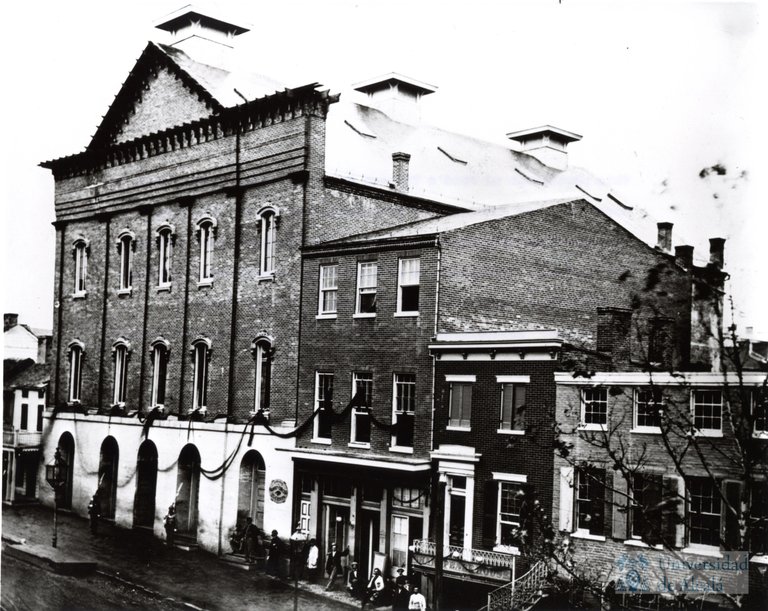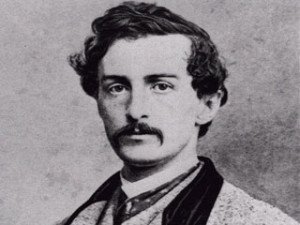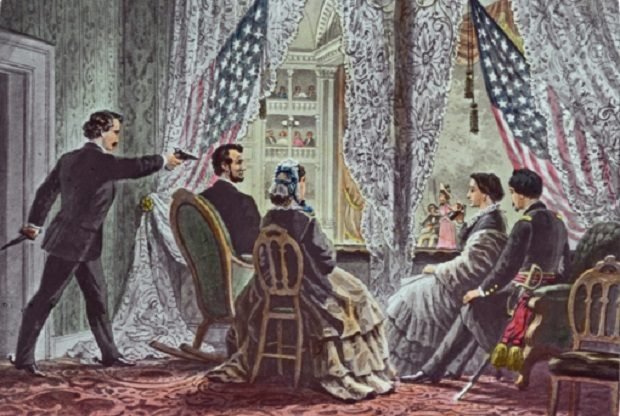On April 14, 1864 actor John W. Booth shot Abraham Lincoln, wounding him to death. He was the first President of the United States to die murdered.
The assassination, in the last days of the War of Secession, shook the country but did not impede the normal functioning of the Government, which was the ultimate goal of the murderer and his collaborators. In this article the main facts of the murder are explained
Events
On April 14, 1865, Good Friday, it was a beautiful spring day. Lincoln, as was his usual habit, got up early and about seven in the morning went to his office. After leaving a note for Seward summoning a cabinet meeting at eleven o'clock and writing another inviting General Grant to attend her, he went to breakfast with his wife and small son Tad. After attending to some people, the president went to the war department to hear the latest news of General Sherman. He had not arrived and returned to his office, where Grant was waiting for him. The general told him some details of Lee's capitulation and pointed out that at any moment the news could arrive that Johnston's confederate army had surrendered to Sherman. At that time, Lincoln said he was sure it would be soon because the previous night he had had a premonitory dream.

When the meeting ended, Grant explained to the president alone the reasons why he could not stay at the representation of Our American cousin Laura Keene, which would take place at the Ford theater later that afternoon. Both were looking forward to catching the train that was heading to Philadelphia that afternoon to see their children, who were in Long Branch, New Jersey. After eating lightly, Lincoln returned to his office. There he signed the pardon of a deserter commenting that surely the boy could serve them more on the land than underground; He revoked the death sentence that weighed on a Confederate spy and signed his signature on other documents. By four o'clock, he had managed to get rid of work for a walk with his wife, from whom they returned at five o'clock in the afternoon.
After dinner, the president returned to make a quick visit to the war department. About a quarter past eight, Lincoln and his wife made their way to the house of Senator Ira Harris, whose stepson Rahtbone and his daughter Clara had accepted the President's invitation to replace the Grant. Finally, at half past eight, Charles Forbes, the coachman of the White House, stopped at the Ford Theater.
When the president entered the room the work was interrupted and the acclamations and applause resounded while an usher led the group to a box adorned with the American flag. Rathbone and Miss Harris took a seat in the front of the box, Mrs. Lincoln sat back and the president, after thanking the ovation, settled into a rocking chair near the back. The sense of security was so considerable that John F. Parker, the bodyguard who usually took care of the president's safety, left the box and decided to enjoy the performance. At a distance from the theater less than a block away, at the moment when Lincoln and his companions came to see the show, a group of men was sitting in the Herndon house between Ninth and F streets. The head of the group was an actor with experience in interpreting to Shakespeare called John Wilkes Booth. A native of Maryland and a member of a family of actors, Booth had sympathized with the Confederates, but he had no problem traveling through the Union-controlled territory. Established some time ago, the group had for a long time the mission of kidnapping Lincoln to exchange it for confederate prisoners and a negotiated peace. Lee's surrender had turned the plan into an absurdity and now Booth was signaling to his companions that he should be changed to assassinate the president. The suggestion of the death of Lincoln had caused the abandonment of some of the recruits and now with Booth were only Lewis Payne, George Atzerodt and Davy Herold. Finally, the meeting dissolved.

Booth rode on a gray mare to the alley behind the Ford theater, went back to the main street, entered the Taltuvall room and ordered a whiskey. When the performance, with which, apparently, Lincoln was enjoying considerably, was in the third act, a man came to Forbes, the coachman of the White House, who was sitting in the hall near the chairman's box, and He extended a note. Forbes examined her and let her in. The man, who was none other than Booth, entered the box, closed the door inside, pulled out a Derringer revolver, and then unleashed a shot on the back of Lincoln's head. A cloud of smoke, followed by a shout, left the place occupied by the president.
Lincoln was moved to a nearby house with his head bleeding. He would not recover his knowledge but he would fight with death for nine hours until, at seven and twenty-two minutes of the morning of April 15, 1865, he expired.
As it is easy to understand, immediately began to appear various explanations pointing to the brain behind the Lincoln assassination. One of the first was that it had been an attack by the Holy See. After all, Pope Pius IX had certainly been the only head of state who had recognized the confederation; practically all of the conspirators were Catholics and Surrat, who managed to escape from the country, found refuge in the Vatican and became a member of the papal guard. As if that were not enough, the voices that indicated the bad eyes with which the Holy See should contemplate the national consolidation of a democracy with Protestant roots and even the supposed witnesses that Lincoln feared a Catholic attack were not lacking.
In the opinion of others, the brain behind Lincoln's murder was in the radical ranks of the Republican Party. According to this theory, a sector of the republican party did not contemplate with good eyes the policy of outstretched hand that Lincoln tried to develop towards the old rebellious states of the south. The death of the president allowed to conjure that danger and replace it with a military occupation of the south. According to the different defenders of that theory, the person responsible would have been either President Johnson or Secretary Stanton.
Finally, there was no shortage of those who attributed the death of the president to a conspiracy of Southern nationalists led directly by Confederate President Jefferson Davis.

In fact, the aspects pointed out in connection with a Catholic conspiracy were true - with the possible exception of Lincoln's fear of being murdered by Catholics - but in no case did it emerge from these circumstances that the Holy See had planned or ordered the assassination of Lincoln. As far as Stanton and Johnson are concerned, they demonstrated an undeniable zeal to catch the conspirators. Finally, the various judicial investigations made it clear that neither Jefferson Davis nor any of his ministers planned Lincoln's death.
What was the process followed for the crime? As Booth noted at the pre-murder meeting, there had been a plan to kidnap Lincoln and exchange him for Confederate prisoners of war. Booth did not tell his companions, but nowadays the involvement of the Confederate intelligence services in that plan is beyond doubt. Southern nationalists had devised a plan that had a chance of success, but when it was about to take place, General Lee surrendered, so the confederation's chances of winning the war - if there were any left - disappeared completely .
Logically, the conspirators should have abandoned their project, but Booth, and there is no evidence that he received superior orders, contemplated the situation in another way. If they managed to assassinate Lincoln and some of the cabinet members, the fate of the war could change. The attempts - that same night - to kill members of the United States government failed, but Lincoln did fall under Booth's shot.
It was a useless death that, paradoxically, would hurt the southern nationalists. During the following years, the radical sector of the republican party began a process of Reconstruction that differed a lot from the policy of outstretched hand conceived by Lincoln. Thus, the assassination of the president not only did not revert to the victory of the south, but also deprived the nation of an exceptional man in the most necessary moments.
Congratulations @angeljonas! You received a personal award!
You can view your badges on your Steem Board and compare to others on the Steem Ranking
Do not miss the last post from @steemitboard:
Vote for @Steemitboard as a witness to get one more award and increased upvotes!
Congratulations @angeljonas! You received a personal award!
Click here to view your Board